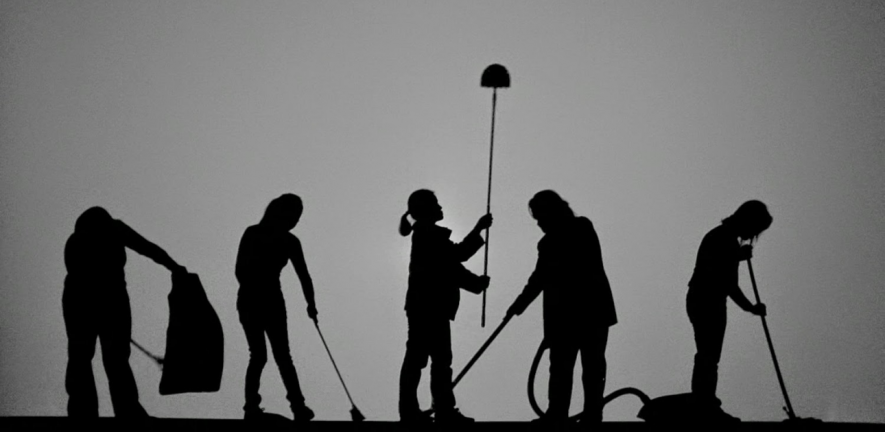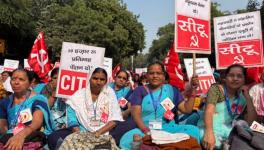International Domestic Workers Day: Lookback at Ghastly Working Conditions in India

Representational Image.
The International Labour Organisation has adopted Convention 189 to ensure decent work for domestic workers. India’s failure to ratify it manifests the perils of a flawed system. While trade unions are hard at work on the issue, the government’s cold shoulder sets them back to square one.
—
It will now be 12 years since the International Labour Conference of the International Labour Organisation (ILO) adopted Convention 189 (decent work for domestic workers) in its historic centenary session on June 12, 2011.
As domestic workers across the world gather to commemorate its passage on International Domestic Workers’ Day, India needs to reflect on the conditions of domestic workers in our own country, especially in the post-pandemic situation.
Miserable conditions of domestic workers
Paid domestic work in its modern form has to be understood in the context of a society where production is essentially organised for profit. Since household chores do not generate profit, not only has this labour been devalued, but it is also invisibilised because it is done within the four walls of a home.
Consequently, workers engaged in this form of labour, mostly women, are also not seen as ‘workers’ and are equally invisibilised and devalued both in economic and social terms.
Several studies reveal that domestic workers across the country work extremely long hours and are denied minimum wages, and do not get even a single day off or paid annual and sick leave, maternity benefits and social security such as pensions. There is no practice of paying any retirement benefits or severance pay after a long tenure with a particular employer.
Those who reside in their employer’s house, or ‘live-in’, often work without any resting period, proper food or living spaces. They may not be paid on time, and are prone to verbal and sexual abuse. Many are migrants at the mercy of unscrupulous and unregulated agents. Recent cases reported in Delhi, where domestic workers were subjected to inhuman treatment by their employers are a case in point.
Domestic workers are often the recipients of stale food, old clothes, utensils and household appliances. They lack dignity of labour and are stigmatised to the extent that many women do not even disclose that they are domestic workers, since they are perceived as doing ‘dirty work’.
During the pandemic, the stigma [of being a domestic worker] surfaced in the form of being shunned as potential ‘carriers’ of the virus.
During the pandemic, the stigma surfaced in the form of being shunned as potential ‘carriers’ of the virus when it is well known that the spread originated in high-income air travellers. There is constant haranguing about the quality of their work. Domestic workers are commonly accused of theft and their dignity is stripped despite the charges being disproved.
The kind of social discrimination they face is astonishing, to say the least! It ranges from being banned in lifts, not permitted to use toilets or common spaces in buildings where they work, to being forced to sit on the floor in their employer’s homes, with the only other option being to stand.
Caste is also an operating factor, and in times of communal polarisation, domestic workers from the Muslim community are facing difficulties to find work. Some of them mask their identity in desperation.
Most domestic workers are reluctant to admit that they face sexual harassment at their workplaces and hardly register any cases under the Sexual Harassment of Women at Workplace (Prevention, Prohibition and Redressal) Act, 2013. Fear of loss of employment and stigma are the main reasons why it is not an openly acknowledged problem.
Many belong to Scheduled Castes, and the number of tribal workers are significant, especially amongst migrant ‘live-in’ workers. Many elderly workers have to continue working due to lack of social security. There is a marked presence of widows and deserted women. Child labour has also increased during the pandemic.
As with the working conditions, the socio-economic conditions of domestic workers are relatively similar across the country. Given their low incomes, most domestic workers live in poor settlements in cities, paying high rents that eat up a substantial portion of their wages.
Lack of water and proper sanitation and other civic infrastructure increases their burdens. The timings of water supply, access and availability of toilets are critical because time is a crucial factor in their work schedule. There are virtually no childcare facilities due to which they have to either leave their children at home alone, or depend on relatives and neighbours, often at great risk to their children.
While many simply walk to work, in large metros such as Mumbai and Kolkata they travel long hours and large distances to work. Lack of good and affordable public transport, displacement and relocation due to urban development are also major problems.
Several studies point to the poor health conditions of domestic workers. Common ailments are backaches, knee problems, allergies due to detergents, and urinary tract infections due to lack of access to toilets. There is no provision for maternity leave or benefit from the employer.
In times of communal polarisation, domestic workers from the Muslim community are facing difficulties to find work. Some of them mask their identity in desperation.
Many women face loss of wages and employment and also have to return to work soon after their pregnancy, which leads to complications. They also suffer from general fatigue and poor health, also brought on by lack of nourishment and poor eating habits.
Mental stress due to constant supervision by employers or financial problems is also common. Many are unable to visit public health facilities because they are open only during the day when they have to be at work.
Several domestic workers suffer from violence meted out by their partners and children. Family members resorting to alcoholism is common, which adds to their vulnerability and also affects their efficiency at work.
Although many manage to obtain ration cards or identity proofs such as an Aadhaar or PAN card, few are found eligible for free rations under the National Food Security Act, 2013. Many depend on moneylenders or their employers for meeting expenses for health emergencies, family events such as marriages, deaths or travelling to their villages.
Partaking in trade unions
Despite these odds, it is striking to witness that domestic workers have managed to make their voices heard and organised into vibrant trade unions that are articulating their demands for recognition as workers, and protective legislation to ensure better working conditions.
Over the last two decades, Central trade unions such as Centre of Indian Trade Unions (CITU), All India Trade Union Congress, Self Employed Women’s Association and other regionally registered organisations under the banner of the national campaign for domestic workers have been raising their demands with different types of street actions, interventions in cases of abuse, postcard and signature campaigns.
Many women face loss of wages and employment [because of maternity leave] and also have to return to work soon after their pregnancy, which leads to complications.
These trade unions are lobbying members of Parliament (MPs) and members of legislative assemblies to take up the issue of a comprehensive legislation for regulating their working conditions and providing them with social security.
These efforts were particularly useful during the run-up to the passage of Convention 189 when the government of India set up a task force in 2009 and even published a policy document in 2011 with recommendations that called for the application of the Minimum Wages Act, 1948, the Maternity Benefit Act, 1961, the Payment of Gratuity Act, 1972 and so on to all major existing labour laws for domestic workers.
But it appears that this was a short lived and mainly cosmetic exercise in order to show the international community that the government of India was committed to the rights of domestic workers. Hence, India supported the passage of Convention 189 at Geneva, but subsequently, its ratification has been put on the back-burner.
A draft legislation in the form of a private member’s Bill moved by Shankar Datta, Rajya Sabha MP and vice president of CITU in 2017 was the last time the issue of domestic workers came up in the Parliament. Interestingly, as many as 16 such Bills have been moved over the last six decades or more, reflecting the success of the domestic workers’ movement in visibilising and vocalising their issues, but also its failure to make substantive gains.
Hence, despite these heroic efforts, domestic workers remain outside the pale of a regulatory legal framework. In a state like West Bengal with a rich history of trade union struggles, the state government has refused to register a union of domestic workers. A similar problem is seen in Delhi.
This is an infringement to Article 19(1)(c) (right to form associations or unions) and collective bargaining that is considered a core convention of the ILO, but which incidentally, India has not ratified!
In some states such as Maharashtra and Tamil Nadu, welfare boards have been set up but their functioning remains desultory. Administrative and bureaucratic problems with registration procedures coupled with a lack of funds and attractive schemes which are usually vote-catching exercises, mean that there is no incentive for the domestic workers to register themselves with welfare boards.
Determining minimum wage for domestic work
Assam, Andhra Pradesh, Jharkhand, Karnataka, Kerala, Meghalaya, Odisha, Punjab, Rajasthan, Tripura, Tamil Nadu and lately Bihar and West Bengal have included domestic workers in their minimum wage schedules and even stipulate a weekly off; but implementation remains highly uncertain. Urbanised states such as Maharashtra and Delhi are yet to notify similar schedules.
There is also a more fundamental question about how to take into account the personalised ‘care’ element of the work while fixing wages, and the fact that it is perceived as ‘unskilled’ work when it is, in fact, quite the opposite. The multi-task, multi-employer, multi-locational nature of paid domestic work itself poses a challenge when it comes to the determination of standard minimum wages.
In some states such as Maharashtra and Tamil Nadu, welfare boards have been set up but their functioning remains desultory.
With labour taking a back seat in the present dispensation, and labour laws being seen as an impediment to the ‘ease of doing business,’ there has been a steady erosion of the power and the workforce of the labour department. It is, therefore, unlikely that any inspection mechanism will be put in place to examine the rights of workers in what is seen as the sacrosanct ‘peace’ space of a household that employs domestic workers.
In fact, with the advent of the four labour codes, which were cleverly pushed by the Modi government during the pandemic, and which will now replace the 44 labour laws that were won on the basis of over a century of struggles by the working class in the country, any hopes of domestic workers being covered by existing labour legislation have receded further.
(Un)promising laws and the government’s silence
The government is making a specious argument that domestic workers will automatically be covered and eligible for minimum wages. But the Code on Wages, 2019 which has been passed in the Parliament, has removed the Schedule of Employment, which lists the industries governed by labour laws.
Domestic workers have been demanding inclusion in the schedule to make the Minimum Wages Act, 1948 applicable to them, but the new code actually denies them this opportunity. The notion of discrimination imbued in the Equal Remuneration Act, 1976 has been reduced only to gender discrimination. Thus, it cannot be applied to the wage discrimination that results from the constructed hierarchy of tasks within paid domestic work.
Similarly, the Draft Code on Social Security (Central) Rules, 2020 has failed to appreciate the fact that the working population in our country consists of a vast multitude of workers in different employment relationships. It has collapsed all workers into one monolithic section, which is particularly detrimental to domestic workers when the nature of their work requires that special attention is paid to their complex work specificities while framing social security programmes for them.
Given the over-centralised structure of the implementation mechanism of this code, it is unlikely that domestic workers will find any representation or voice in it. It warrants every employer, employee and each employer–employee relationship to be registered. Domestic workers with multiple employers will find it extremely hard to register for coverage.
The multi-task, multi-employer, multi-locational nature of paid domestic work itself poses a challenge when it comes to determination of standard minimum wages.
Most importantly, the code rejects the language of rights and uses the framework of benefits.
In the current circumstances, the challenges faced by domestic workers are manifold. The biggest is the implicit refusal by the Modi government to acknowledge the rights of domestic workers, or for that matter, of all informal and formal workers in the country.
The current dispensation prefers the ‘welfarist’ approach that traps the workers into a web of conditions that determine their eligibility for schemes. They have to spend hours online to enrol for paltry benefits. This is a process that actually reinforces the “revdi” (beneficiary) culture that the Prime Minister himself publicly reviled some months ago. Enrolment in the e-Shram portal is a case in point as it is still not clear what tangible benefits will ensue to those who have enrolled.
A previous labour minister said that India has not ratified Convention 189 because the necessary laws are not in place. This is a bit of a chicken and egg situation, but the real reason is that the government does not want to do so.
That would mean bringing labour laws into the drawing room, when they need to be shunned in order to bring in the ‘flexibility’ which the captains of the industry desire.
The Draft Code has collapsed all workers into one monolithic section, which is particularly detrimental to domestic workers.
The truth is that domestic workers have been the greatest victims of ‘flexibility,’ always being fired at the whims and fancies of their employers! Overcoming this challenge will require hard work by the unions of domestic workers to build a consciousness that will unite them as workers, beyond caste and community.
In the given situation, with unemployment looming large and inflation even larger, the odds are actually stacked against them. Finding time to organise is itself a problem. But without organisation, nothing can change. Domestic workers over the world have proved this by getting the ILO to frame and pass Convention 189. Domestic workers in India have no choice but to emulate them!
Kiran Moghe is a Marxist politician, trade unionist and social worker.
Get the latest reports & analysis with people's perspective on Protests, movements & deep analytical videos, discussions of the current affairs in your Telegram app. Subscribe to NewsClick's Telegram channel & get Real-Time updates on stories, as they get published on our website.
























